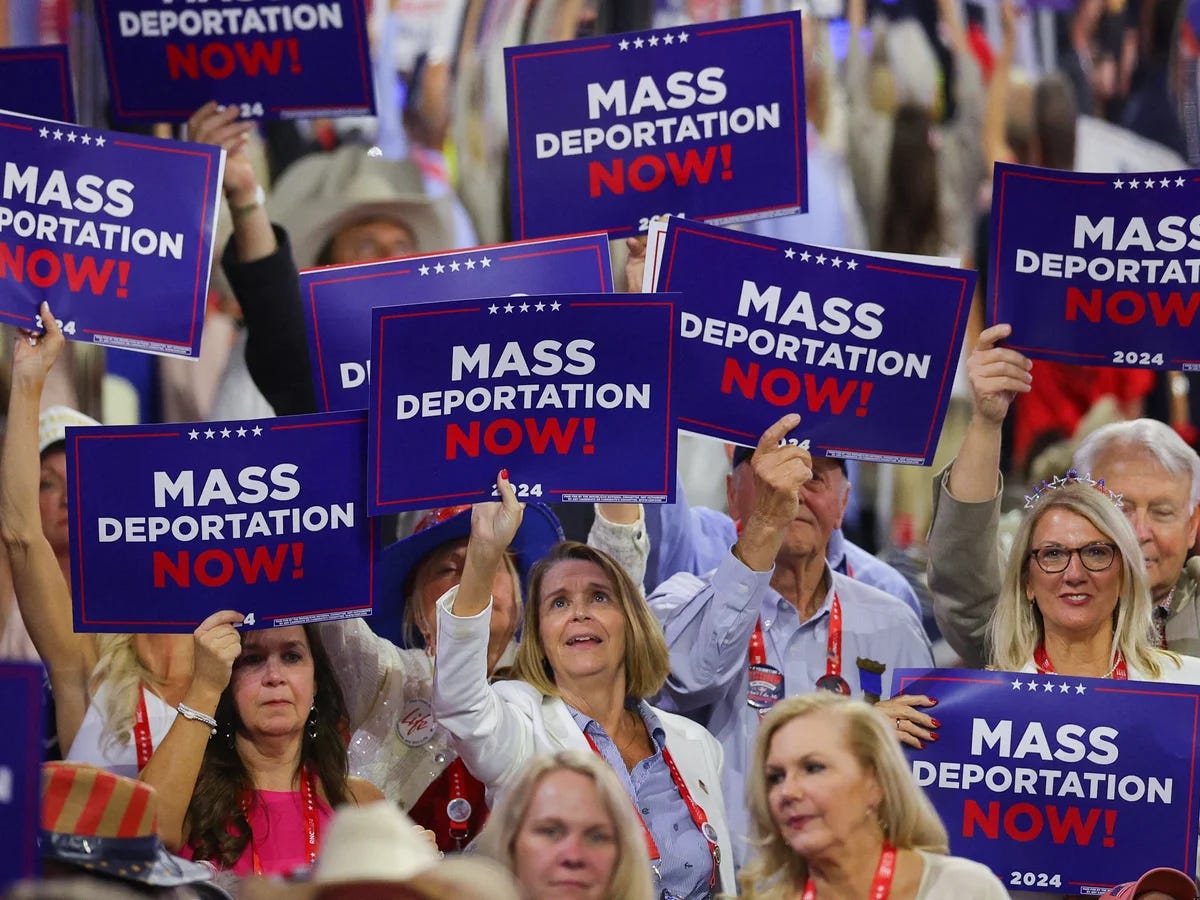111: The Politics of Othering: How the Far Right Justifies Oppression
The Unacceptable Danger of Dehumanization
Thank you to Barbara N, Kevin, and Jason M., for upgrading your subscriptions to paid! We find the courage to fight fascism because we know we’re not alone! This publication will always remain free to everyone, but paid subs do help with morale. ✊🏼
One of the most insidious threats to democracy isn’t just bad policy, corruption, or even authoritarianism itself—it’s the act of dehumanization. It is the foundation upon which the worst atrocities in history have been built. When we allow it to take root, we enable cruelty, justify oppression, and pave the way for violence.
Dehumanization is not a matter of opinion. It is not a policy disagreement or a debate about ideology. It is a deliberate strategy that seeks to strip certain people of their humanity to make them easier to target, control, and destroy.
At its core, dehumanization begins with othering—the process of marking certain people as fundamentally different, alien, or even dangerous. In some ways we can all be guilty of doing this when we differentiate ourselves, or comment on the difference of others. It is an easy tactic when arguing, “you don’t understand, you’re not like me” or as Kendrick says you’re “not like us”.
However this tactic easily becomes a rhetorical and psychological weapon, used to justify the unjustifiable. And in today’s political landscape, it is the primary tool of the far right, particularly the cult of MAGA.
The MAGA Playbook: Dehumanization in Action
Trumpism thrives on division, but not just any division—it cultivates an "us versus them" mentality so extreme that it turns political opponents, immigrants, marginalized communities, and entire professions (journalists, educators, election workers) into existential threats.
Consider these recurring themes in MAGA rhetoric:
Demonizing immigrants: Trump’s language about migrants being “animals,” an “invasion,” or “poisoning the blood of America” is not accidental. It echoes fascist rhetoric of the past, turning people fleeing violence and poverty into faceless threats.
Portraying political opponents as subhuman: Trump and his allies frequently call Democrats and critics “vermin,” “thugs,” “traitors,” or even “enemies of the people.” Such language justifies extreme actions against them.
Casting entire groups as irredeemable: Whether it’s LGBTQ+ people, Black activists, or academic institutions, the far right consistently argues that certain communities are not just wrong, but dangerous and fundamentally incompatible with their vision of America.
Normalizing political violence: When Trump jokes about executing military leaders he dislikes, when his supporters attack the Capitol, when threats against public officials skyrocket—it’s not an accident. Dehumanization makes violence easier to justify.
None of this is about debate or discussion. This is about power. Once a group is sufficiently dehumanized, laws can be passed to strip them of rights, media can ignore their suffering, and violence against them becomes accepted, if not encouraged.
Why This Must Be Confronted
The temptation, especially in centrist or liberal circles, is to treat this as another example of "political polarization." That is a fatal mistake. There is no "both sides" when it comes to dehumanization. There is no valid perspective that argues for treating people as less than human.
Unfortunately a lot of people across the political spectrum are seduced by the power of the insult and in particular the power of dehumanization. We must reflect on how we do it ourselves, to friends, when we suggest that their difference is a liability rather than an asset.
When we tolerate dehumanization in our discourse, we signal that it is acceptable. When we let it go unchallenged, we allow it to spread. The consequences are not theoretical—they are real, and they are dire. History tells us what happens when dehumanization is normalized.
We must be clear-eyed and relentless in pushing back against dehumanization whenever it appears. That means:
Calling it out every time: When politicians, media figures, or even people in our personal lives use dehumanizing language, we must name it for what it is.
Refusing to engage on their terms: The far right wants to drag people into dehumanizing debates (“Are trans people really people?” “Are immigrants destroying America?”). These are not discussions—they are traps. Don’t take the bait. Reject the premise.
Supporting those targeted: Defending the dignity and rights of those under attack is non-negotiable. This includes legal defense, mutual aid, and amplifying voices that are being silenced.
Holding media accountable: News outlets often launder dehumanizing rhetoric under the guise of “just reporting the news.” Demand better from them, or better yet, find alternatives.
Building solidarity: The best defense against dehumanization is a strong, interconnected community that refuses to be divided. The more we invest in solidarity across lines of race, gender, class, and ethnicity, the harder it becomes for dehumanization to take hold.
The Line We Cannot Cross
Dehumanization is the threshold of tyranny. If we allow it to become normalized, we allow the very conditions that make fascism possible. This is not about being “nice” or “tolerant” or “civil.” It is about maintaining the moral and political foundations of democracy itself.
We must reject dehumanization—not as a political stance, but as a fundamental commitment to the dignity of all people. Because if we don’t, history has already shown us where this road leads.







I wish this wasn't couched in the language of "left" and "right", as it allows a large portion of those indoctrinated in (and thus engaged in, even if they are not consciously aware) dehumanization to do the standard "not me, I'm one of the good ones".
The entire concept of the mislabelled "age of discovery", and colonization of the continents which Europeans branded as the "Americas" after Italian Amerigo Vespucci, is based on dehumanization. I don’t hang around many people who would self-identify as being “far right” or even “right wing”, but I hear this othering all the time from self-identified “progressives”.
There are so many books I’ve read that discuss why it is so hard to discuss dehumanizing with those who have been indoctrinated since birth in that “othering”.
Dehumanization is not a "human" trait, but a cultural trait.
Generating an “other” that can be dehumanized is, for instance, the entire purpose the British/American and other Western European countries and colonies had for creating the hierarchical social construct of “race”. Racism is alive and well, in both the “left” and “right”, within the British North American settler-colonial societies of USA and Canada.
Getting individuals who self-identify as “left” or “progressive” to recognize and dismantle the systems of dehumanization that they are part of is key to change. Thus far all I have seen is “our dehumanization” vs “their dehumanization”.
https://r.flora.ca/p/should-you-be-upset-at-individual
Unfortunately, we are all guilty of othering. Simple as us versus them. We find it easier to trust those that are like us, part of our tribe. This does not make it acceptable. Hillary Clinton was chastised for calling maga supporters deplorables. I find myself, not so secretly, agreeing with her and my humanity is diminished.